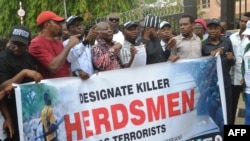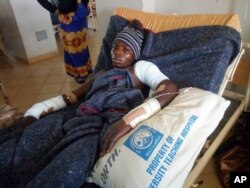The violent conflicts between farmers and semi-nomadic herders in Nigeria that left dozens of people dead over the weekend illustrate the intensifying pressure and competition for arable land in Africa, experts said Monday.
Fertile land that is dwindling due to climate change combined with a population boom are fueling conflicts across the continent, they said.
The weekend deaths of at least 86 people in Nigeria's central Plateau state are seen as part of an escalation of conflicts that have raged for years, often over land.
Nigeria has one of the world's fastest-growing populations, rapidly approaching 200 million and expected to be bigger than the United States by 2050, according to United Nations estimates.
With the Boko Haram jihadists' insurgency in the last decade in Nigeria's central and northern states, herders have been pushed south to populated farming areas, said Rinaldo Depagne, West Africa project director for the International Crisis Group (ICG).
At least 2,000 people died annually in Nigeria's Middle Belt due to communal land conflicts between cattle herders and farmers between 2011 and 2016, the ICG estimates.
The weekend clashes are "the extension of the violence," Depagne told Reuters.
Africa's arable land is being taken up by infrastructure, farmers and multinational agricultural firms seeking to produce food for a growing population, depriving herders of grazing reserves, Depagne said.
"More people to feed means more agricultural settlement and less available land and water for herders. All of this tend to trigger more and more disputes," he said.
Relations between the nomadic Fulani herders and farming communities in Mali and Niger also have been chaotic, with fights over cropland, grazing, water and migration routes, experts say.
Climate change — bringing extreme weather, droughts and desertification — has increased conflict over land, said Tim Christophersen, coordinator of fresh water, land and climate at United Nations Environment Program (UNEP).
Access to water
Both climate change and conflict can mean limited access to clean water, and that affects agricultural productivity, he told Reuters.
"We should stop the degradation of land and invest in restoring landscape," he said, suggesting more strategies for resilience, crop diversification and more "climate-smart" agriculture. "We need to make societies more resilient by ensuring that people have alternative livelihoods that makes them use their land in a sustainable way."
The drought and desertification have degraded pastures and dried up many natural water sources across Nigeria's northern state, forcing herders south in search of grassland, Depagne said.
The spread of conflict into the southern states is aggravating already fragile relations among the country's major regional, ethnic and religious groups, he said.
The south's majority Christian communities resent the influx of predominantly Muslim herders, he said.
Authorities imposed a dusk-to-dawn curfew in central Plateau state after the weekend fighting.
The violence in Nigeria's diverse Middle Belt states has killed more people than the Islamist insurgency in Nigeria's northeast, according to Reuters calculations.






